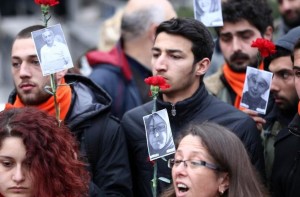Commozione ad Ankara oggi durante una Marcia silenziosa per le 37 vittime della strage del 13 marzo a Kizilay. Tra le vittime anche Kamal Bulut, padre dell’attaccante del Galatasaray.
Oggi il regime di Erdogan ha risposto con una serie di attacchi contro obiettivi curdi. La controffensiva scatta all’indomani di forti avvertimenti americani come quello ospitato il 10 marzo dall’autorevole Washington Post con questo intervento di due ex ambasciatori Usa in Turchia, Mort Abramowitz ed Eric Edelman i quali cinque giorni fa hanno chiesto dunque riforme oppure dimissioni. Ecco l’editoriale dei due ex ambasciatori, accompagnato da immagini di cariche di polizia e gas lacrimogeni sotto la sede del quotidiano Zaman:
Turkey’s Erdogan must reform or resign
By Mort Abramowitz and Eric Edelman March 10
Mort Abramowitz and Eric Edelman, both former U.S. ambassadors to Turkey, co-chair the Bipartisan Policy Center’s Turkey Initiative. Abramowitz is a senior fellow at the Century Foundation and Edelman is a practitioner-in-residence at the Johns Hopkins School of Advanced International Studies.
Under the leadership of President Recep Tayyip Erdogan, Turkey has steadily descended into authoritarianism and instability. The recent government seizure of one of the main opposition media groups, including Turkey’s highest-circulation newspaper, is only the latest demonstration of how Erdogan has betrayed his county’s potential.
When Erdogan and his Justice and Development Party (AK Party) took power in 2003, they strengthened the Turkish economy and improved Turkey’s relations with its neighbors. The AK Party pursued European Union membership, ended military domination over Turkish politics and tried to find a peaceful solution to the country’s long-standing Kurdish problem.
By 2012, Erdogan could confidently declare, “We have a bright future.” After nearly a decade of political progress, economic growth and growing international approval, he could dare to promise that by 2023, the centenary of the republic, Turkey would be “one of the greatest powers of its region and the world.”
Today, Turkey’s future looks much bleaker. Rather than greatness, Erdogan has steered it toward authoritarianism, economic slowdown and civil war.
Indeed, recent developments in Turkey bring to mind frightening cliches and ark moments of 20th-century totalitarianism. An AK Party parliamentarian led a mob to attack the offices of a newspaper lambasted by Erdogan just days prior. Several AK Party members, including former president Abdullah Gul, have been removed from an official online list of the party’s founding members. Among thousands of others, a 13-year-old boy was arrested for insulting Erdogan, and a woman who did likewise was denounced in the courts by her own husband. Tens of thousands of children, including religious minorities, have been forcibly sent to Islamic schools or subjected to mandatory Islamic religious education. Now, as Erdogan seeks to transform the Turkish constitution to entrench his power as president, such abuses will likely become the norm.
Authoritarian leaders usually justify their rule by insisting they are bringing their citizens stability and prosperity. In Turkey, Erdogan’s policies are putting both of these further beyond the people’s reach. After supporting and arming extremist groups in the Syrian conflict, Turkey is now experiencing dangerous blowback from the terrorism it helped stoke. Bombings in Istanbul and Ankara have created shocking scenes of carnage. Yet Turkey continues to insist that Syrian Kurdish groups — not the Islamic State or Jabhat al-Nusra — are the greatest threat in Syria.
The repercussions of this authoritarianism and instability are taking their toll on Turkey’s tourism industry and scaring away foreign investors, leaving many economists worried about the future of the Turkish economy. In 2008, the Turkish lira was almost equal to the dollar. Now the exchange rate is 3-to-1 . And while Turkey’s efforts to care for millions of Syrian refugees are truly impressive, they tax the Turkish economy in ways that ordinary citizens are all too aware of.
Worse, the collapse of negotiations between the AK Party and the Kurdistan Workers’ Party (PKK) last year has reignited a military conflict that many hoped Turkey was on the verge of resolving. The PKK is a terrorist group with a track record of violence that hardly makes it an ideal partner for peace, but the Turkish people nonetheless have the right to hold their government accountable for the negotiations’ failure. Now, Turkish soldiers and civilians continue to die in a worsening conflict, and the government has no realistic plan for stopping or winning it. The horrible bombing in Ankara on Feb. 17, carried out by a PKK splinter faction, portends a spread of violence that could throw Turkey back into the civil war that decimated the country in the 1970s and ’80s.
We continue to believe that a strong, stable and democratic Turkey is both possible and essential. But this requires a government committed to these goals and intent on achieving them. If Erdogan still wants to deliver a brighter future for his country, he has to reform or resign.


